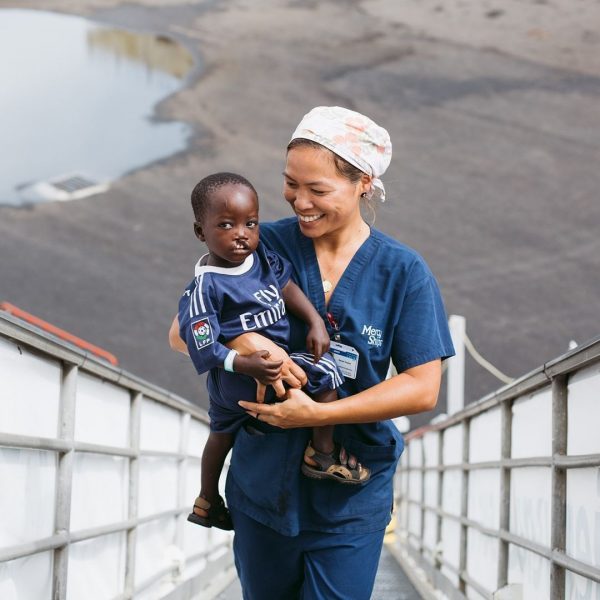Innovation can mean different things to different people and organizations. For international charity Mercy Ships, innovation means using hospital ships, dedicated volunteers and generous partners to transform lives in the world’s poorest nations.

Mercy Ships operates state-of-the-art hospital ships run by skilled volunteers to deliver free surgery and healthcare services in developing countries. 5 billion people worldwide do not have access to safe, affordable and timely surgery, and Mercy Ships addresses this global crisis by providing direct surgical care to those with little to no access.
Operating a unique model, the work of Mercy Ships is supported by donations, corporate partners, and volunteers who donate their time and professional skills. Every year around 1,000 volunteers from over 40 nations travel to the Africa Mercy to support their mission. These volunteers come with a wide range of skills and professional experience – in addition to medical volunteers, technical volunteers like Canadian Engineer Irik Mallie are also vital to the ship’s operations.
Irik and his wife Cathy have served onboard the Africa Mercy in various field services since 2009, working in Benin, Sierra Leone and Madagascar. Irik works as the ship’s chief engineer and Cathy as a palliative care counselor.
“I have the responsibility of 57 people in the engineering department,” says Mallie. “There are a total of over 400 regular crew and another 120 day workers… Some stay for two weeks and some for many years. The crew members come from many different countries, which makes this a unique place to work. Although our rewards are not in a monetary way the satisfaction is in the fact that you see the healed patients walk off the gangway.”
Working onboard the Africa Mercy is unlike working anywhere else. The ship, a converted Danish ferry, first came into service in 1984. She was bought by Mercy Ships in 1999 and converted into a hospital ship.

“Working on a ship in West Africa has many unique challenges like no quick delivery of spare parts, no reliable water supply to the ship and the high temperatures and humidity,” Mallie emphasizes. “There is one thing more different than all other companies and that is that all of us want to work. That is very special and cannot be found on any other ship.”
With 50% of the world’s population living within 100 miles of the coast, ships are the most efficient platform to provide free surgery, medical training and capacity building to regions where clean water, electricity, medical facilities and skilled personnel may be limited or non-existent.
In full operation, the Africa Mercy has five operating theatres, a hospital with 82 beds, and hospitality, pharmacy, housekeeping, dining room and engineering departments. The ship also has a K-12 academy for children of crewmembers. The volunteer crew provides free surgical procedures onboard including cataract removal/lens implants, tumour removal, cleft lip and palate reconstruction, orthopaedic (club feet and bowed legs), women’s health (including obstetric fistula repair), plastic, and general surgeries as well as some ambulatory day surgery procedures. The hospital contains a CT scanner, X-ray, and laboratory services which support the surgical service.
Mercy Ships mobilizes global volunteers and partners to create an extraordinary global impact – and they’re just getting started. Striving towards another 100,000 free surgical procedures, recruiting more volunteers, and growing their fleet of hospital ships, Mercy Ships is using innovation to create significant change in the world for those who need it most.














